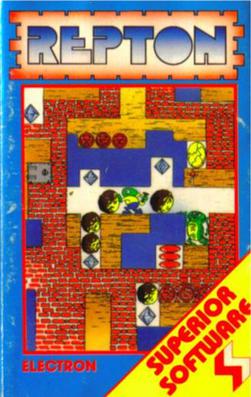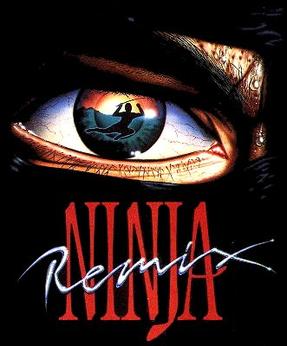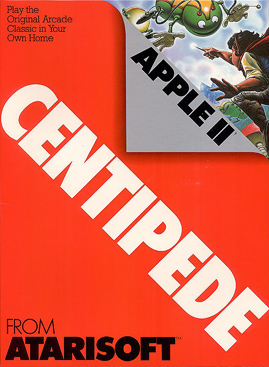Andrew Nicholas Oliver and Philip Edward Oliver, together known as the Oliver Twins, are British twin brothers and video game designers.
Acornsoft was the software arm of Acorn Computers, and a major publisher of software for the BBC Micro and Acorn Electron. As well as games, it also produced a large number of educational titles, extra computer languages and business and utility packages – these included word processor VIEW and the spreadsheet ViewSheet supplied on ROM and cartridge for the BBC Micro/Acorn Electron and included as standard in the BBC Master and Acorn Business Computer.

Repton is a video game originally developed by 16-year-old Briton Tim Tyler for the BBC Micro and Acorn Electron and released by Superior Software in 1985. The game spawned a series of follow up games which were released throughout the 1980s. The series sold around 125,000 copies between 1985 and 1990 with Repton 2 selling 35,000 itself. The games have since been remade for several modern systems, including iRepton for the iPhone / iPod Touch in 2010, and Android Repton 1, Android Repton 2 and Android Repton 3 from 2016 to 2018.

Last Ninja is a series of video games published by System 3. The first game in the series titled The Last Ninja, was released in 1987 for the Commodore 64 and was one of the most successful games for the system. In 1988, System 3 released Last Ninja 2, and in 1991 the third game in the series, Last Ninja 3. In 1990, Last Ninja Remix was released for 8-bit systems. This was Last Ninja 2 with new music, a new introductory sequence, slightly changed graphics and fixed bugs. Confusingly, the 16-bit versions of the original The Last Ninja game were also released in 1990 as Ninja Remix.

Jet Set Willy II: The Final Frontier is a platform game released 1985 by Software Projects as the Amstrad CPC port of Jet Set Willy. It was then rebranded as the sequel and ported to other home computers. Jet Set Willy II was developed by Derrick P. Rowson and Steve Wetherill rather than Jet Set Willy programmer Matthew Smith and is an expansion of the original game, rather than an entirely new one.

Tynesoft Computer Software was a software developer and publisher in the 1980s and early 1990s.

Atarisoft was a brand name used by Atari, Inc. in 1983 and 1984 to publish video games for non-Atari home computers and consoles. Each platform had a specific color for its game packages: video games sold for the Commodore 64 were in green boxes, games for the TI-99/4A in yellow, the IBM PC in blue, and so on.

Artic Computing was a software development company based in Brandesburton, England from 1980 to 1986. The company's first games were for the Sinclair ZX81 home computer, but they expanded and were also responsible for various ZX Spectrum, Commodore 64, BBC Micro, Acorn Electron and Amstrad CPC computer games. The company was set up by Richard Turner and Chris Thornton. Charles Cecil, who later founded Revolution Software, joined the company shortly after it was founded, writing Adventures B through D. Developer Jon Ritman produced a number of ZX81 and Spectrum games for Artic before moving to Ocean Software.
Blue Ribbon was the budget computer software publishing label of CDS Micro Systems.

Graphic Adventure Creator is a game creation system/programming language for adventure games published by Incentive Software, originally written on the Amstrad CPC by Sean Ellis, and then ported to other platforms by, amongst others, Brendan Kelly (Spectrum), Dave Kirby and "The Kid" (C64). The pictures in the demo adventure, Ransom, were made by Pete James and the box cover art by Pete Carter.

Hunchback is a video game developed by Century Electronics and published in arcades in 1983. The game is loosely based on the 1831 Victor Hugo novel The Hunchback of Notre-Dame and the player controls Quasimodo. Set on top of a castle wall, the player must guide the Hunchback from left to right while avoiding obstacles on a series of non-scrolling screens. The goal of each screen is to ring the church bell at the far right.
Alligata Software Ltd. was a computer games developer and publisher based in Sheffield in the UK in the 1980s.
Lunar Rescue is an arcade game released by Taito in November 1979. The gameplay has some resemblance to both Taito's own 1978 hit Space Invaders and Atari, Inc.'s Lunar Lander.
Atlantis Software was a London-based UK computer games publisher that released a number of games during the 1980s and early 1990s.

Superman: The Game is a 1985 video game designed by Fernando Herrera and published in the US by First Star Software for the Commodore 64. For European release, Superman was ported the Acorn Electron, Amstrad CPC, Atari 8-bit computers, BBC Micro, and ZX Spectrum.
Addictive Games was a UK video game publisher in the 1980s and early 1990s. It is best known for the Football Manager series of games created by company founder Kevin Toms. The company was originally based in Milton Keynes, England, and later relocated to Bournemouth, in southern England.

Superman: The Man of Steel is a 1989 video game featuring the DC Comics character Superman. It was developed and published by UK software company Tynesoft under license from First Star Software.
The English Software Company, later shortened to English Software, was a Manchester, UK-based video game developer and publisher that operated from 1982 until 1987. Starting with its first release, the horizontally scrolling shooter Airstrike, English Software focused on Atari 8-bit computers of home, then expanded to other platforms. The company used the slogan "The power of excitement".

Jet-Boot Jack is a platform game written by Jon Williams for Atari 8-bit computers and published by English Software in 1983. It was ported to the Acorn Electron, Amstrad CPC, BBC Micro, and Commodore 64. A C64-only sequel, Legend of the Knucker-Hole, was released in 1984.












